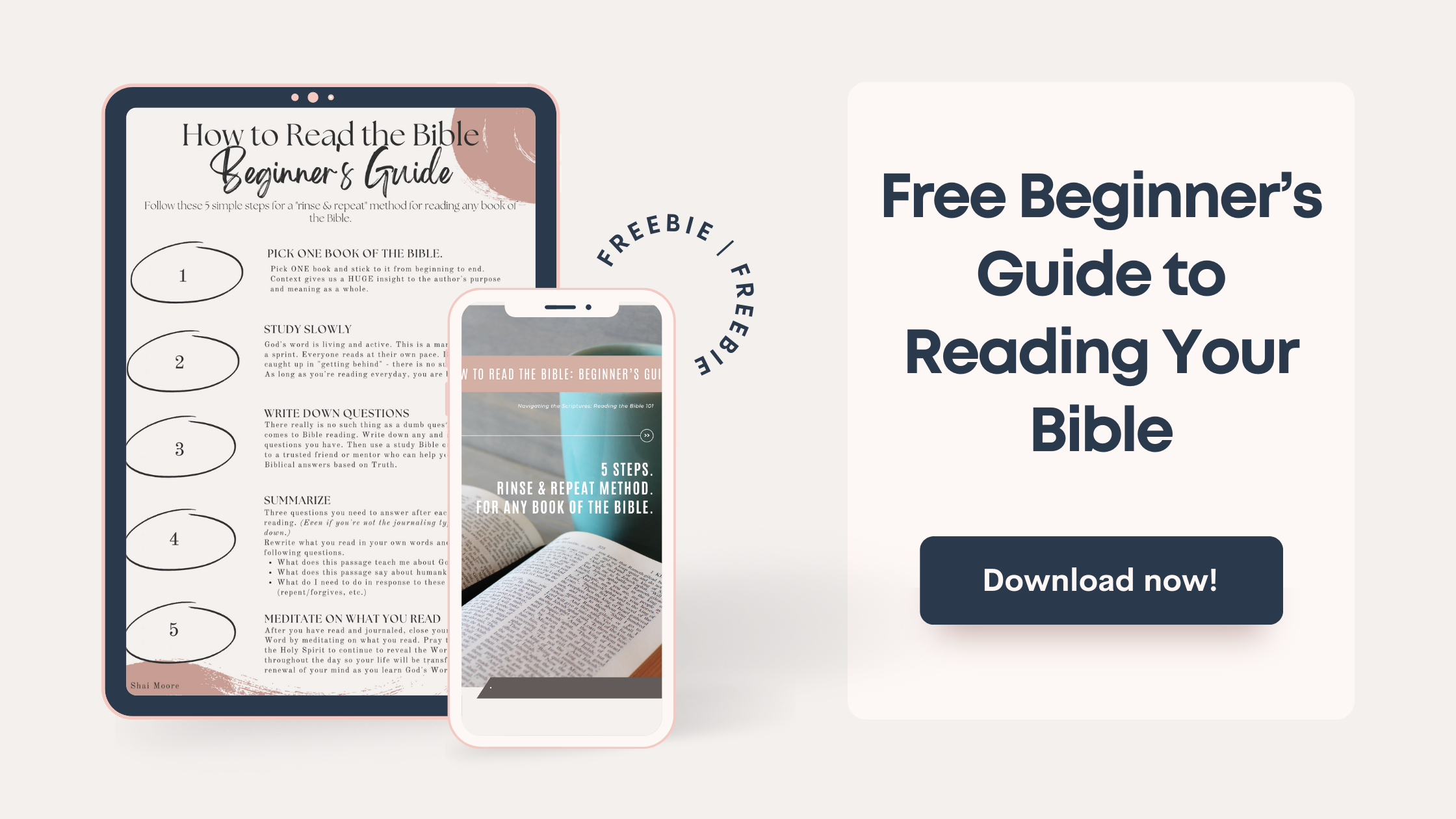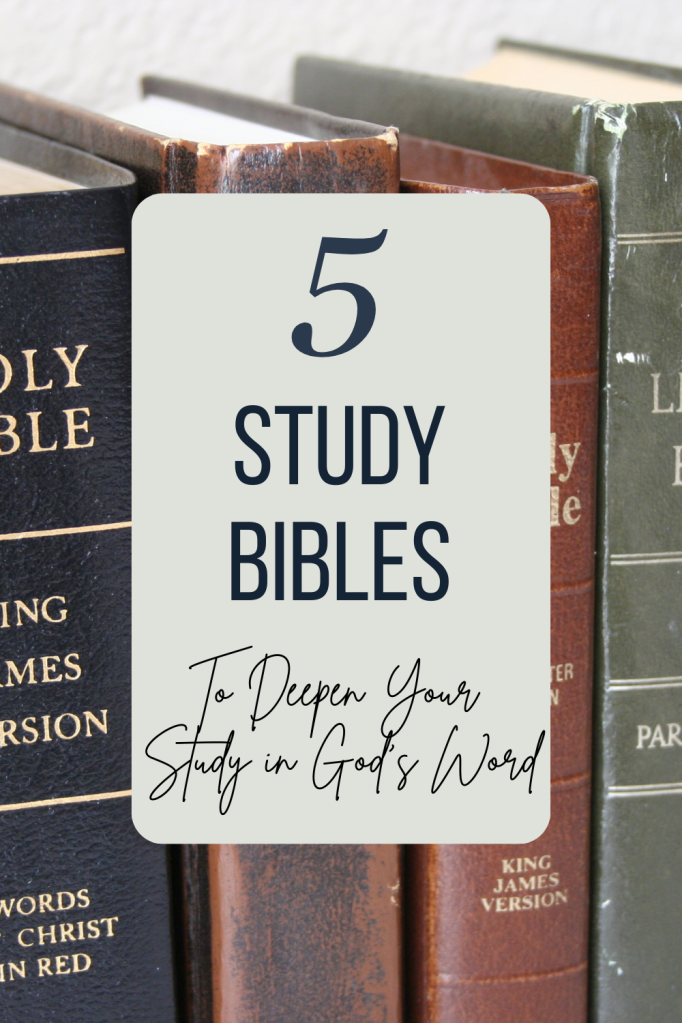Join me on YouTube as we study the entire book of Colossians - verse by verse.
MENU
Hands down, the most common question I get is, “What Bible do you use?”
The Bible can be hard to understand, especially when you’re first starting to read it. So the question of, “Which Study Bible should I use?” can seem daunting.
Not to mention the options are limitless and overwhelming. And not all Study Bibles are created equal. In this day and age especially, we need to have discernment on which publisher to trust when we are reading extra commentary for God’s Word.
A couple things to keep in mind when you’re looking at Study Bibles:
Remember that God’s Word is inerrant. There is no error from Genesis to Revelation. No human is infallible when it comes to interpreting God’s Word. Make sure and use discernment when reading commentary.
With that being said, don’t just blindly follow a person’s interpretations without testing Scripture for yourself.
This goes for any Study Bible you use.
With that being said, I have compiled a list of my Top 5 Study Bibles that I use with a description for each, so that you can choose which is best for you.
Note: This post may contain affiliate links. At no cost to you, I may make a small commission on anything you purchase through my link. But don’t worry, I never promote products that I don’t believe in or truly love.
If you’re ready to start reading your Bible but you have no idea where to start, make sure and grab my FREE Download. This simple 5-Step Rinse and Repeat method will give you clarity on what questions to ask as you’re reading God’s Word so that you can understand it better.

Without further ado, let’s dive in…
Top 5 Study Bibles You Should Choose From
Let’s start with the Study Bible I use most often. This Bible is the one I take to church, I write in, and use for my daily reading.
The ESV Study Bible
I like this Study Bible because its notes on verses explain things very well and are easy to understand.
If some verses are confusing, this study Bible lists how different people interpret the verses and then uses scripture to back up their final interpretation.
The ESV Study Bible also has a lot of extra notes for each book of the Bible as well as doctrines to the Christian faith with information on church history.
What I appreciate the most about this Bible is that it holds firmly to first tier issues (the core beliefs of the Christian faith – virgin birth, Christ’s atonement of sin, His second return, and salvation by grace alone through faith alone) while giving room for second and third tier issues for the reader to decide (eschatology and gifts of the Spirit).
I’d definitely recommend the ESV Study Bible to anyone looking for something solid, yet easy to understand. I have the personal size – you can check it out here.
The John MacArthur Study Bible
The next Bible that I would recommend is the John MacArthur Study Bible. I use the ESV but there are other translations too. This was the first study Bible my husband and I had when we were learning how to read the Bible for ourselves.
John MacArthur is a teacher that I trust on the core doctrines of Christianity. His commentary is easy to read and the notes are easy to understand.
The index is in-depth so you can find almost any verse you’re looking for in the back. (I am stubborn and don’t like using Google, ha!)
There are also plenty of notes and information on each book of the Bible so you can have a solid foundation of context no matter what book of the Bible you’re reading.
The one downside (if you can even call it that) is that his commentary holds third tier issues tightly. So when you read scripture about Christ’s second return or the gifts of the Spirit, the notes will align with his personal interpretation (Pre-mil Dispensationalism and cessationism).
Again, these aren’t heretical, but as my husband and I grew in our knowledge of the Word we realized we didn’t agree with every single thing the commentary said. If you’re aware of the differences, then it’s not a big deal.
My oldest son uses this Bible for his daily reading, so I would recommend this to others as well.
You can check out the John MacArthur Study Bible here.
The Reformation Study Bible
The third study Bible I’d recommend is the Reformation Study Bible.
This Bible is what I call a Study Bible on steroids. It’s packed full of commentary and includes different catechisms, creeds and confessions, and articles from other men on hermeneutics, reformation, worship, and so much more!
This Bible is very big so I don’t use it for my daily reading or Sunday mornings, but I reference it often.
It’s definitely one to have on your bookshelf! You can check it out here.

The Archeological Study Bible
The fourth study Bible that I recommend is the Archeological Study Bible. There are several of these out there but this is the one I use. It is the NIV translation which I like to read when I am studying so I can see how it reads. (It’s good to read from several translations to get an overall view of the Scripture.)
What I love about this Bible is along with its commentary on Scripture, it also has loads of notes and articles on the history behind the Scripture. Anything from remains that have been found to prove the authenticity of the Bible and touching on cultural traditions that were around during the different historical periods that the Bible was written.
Again this is not one I use for daily study, but we pull out and reference often! You can see it here!
The Literary Study Bible
The last Study Bible that I would recommend is the Literary Study Bible. This Bible is different than the others that I have listed so far. While this Bible doesn’t have commentary for most verses, it breaks the Bible down into its correct literary genres.
This isn’t something you hear often when people are talking about reading the Bible. But it’s very important. Context matters and the genres each book is written in, affects the way we read them.
For example, I will not read Genesis the same way I read the Psalms. Genesis is written as a historical narrative whereas Psalms are poetry and songs. When I approach Revelation, I will read it as apocalyptic writing, expecting symbolism, hyperboles, and more.
So if you’re like me and English was your least favorite subject, then this is a great overview of the different literary terms, genres, and how they apply to each book of the Bible.
Each chapter of the Bible is given a summary with the literary features listed, so it is very in depth as far as that goes.
You won’t have a breakdown of each verse but rather a birds’ eye view of the chapter and book as a whole.
You should definitely have this on your bookshelf!
I use this one for reference often! I definitely recommend this if you’re wanting to go deeper into the context and literature of Scripture.
BONUS Recommendation
I am adding a BONUS to my list because while this Bible is called a Study Bible, it’s more of a commentary of Church leaders.
The Church History Study Bible is what my husband uses as his daily reading. He and I love to listen and read to the older church fathers and leaders. It keeps us grounded while giving us a broader outlook of our Christian faith.
Instead of notes on the different verses, this Bible has commentary from church history’s well known men – Athanasius, Martin Luther, Jonathan Edwards, John Bunyan, and Charles Spurgeon.
It’s definitely something I reference often to go along with my daily Bible reading.
It’s an enriching addition to your Bible reading!
In Conclusion
When using Study Bibles, remember that the Bible itself is without error, yet human interpretations may vary. Be discerning with commentaries and test interpretations against Scripture. Here are my top five Study Bibles that I use often:
ESV Study Bible: Solid explanations, church history, and clarity on core Christian beliefs.
John MacArthur Study Bible: Trusted teachings, easy readability, and comprehensive indexing.
Reformation Study Bible: Packed with commentary, catechisms, and additional writings, though quite extensive for daily use.
Archaeological Study Bible: Offers historical insights alongside commentary, particularly beneficial for understanding cultural contexts.
Literary Study Bible: Focuses on literary genres, providing an overview of different writing styles within the Bible.
Additionally, a bonus recommendation is the Church History Study Bible, featuring commentary from prominent church leaders throughout history, providing a broader perspective on the Christian faith.
Each Study Bible has its advantages and purposes. Consider your preferences and needs to select the one that fits best with your study goals.
See y’all around,
Shai
P.S.
This guide will help you take your Bible reading to the next level. You can print it out and keep it in your Bible to use every day!

Leave a Reply Cancel reply
Chocolate wafer toffee cotton candy icing. Biscuit sugar plum wafer ice cream bonbon caramels halvah. Chocolate jujubes jujubes chupa chups cookie jelly-o gingerbread.
I'm Brianna Rose, wearer of many (cute) hats for business owners in need of extra help.
Hear my story
© 2024 Brianna Rose. All rights reserved • Privacy Policy • Site by SUGAR STUDIOS
@walkinginexile
join the party over on
Christ follower, wife, & homeschool mom. Being a teacher to my core - I love sharing all things Bible reading and showing women how they can work in the online world through a Christian worldview.
christ follower + digital marketing strategist
I WANT IN ON THIS
[…] the right study Bible is a huge part when it comes to reading your Bible. You can check out my top 5 Study Bibles that I use here. While there isn’t one “right” study Bible to use, it is important to use discernment when we […]